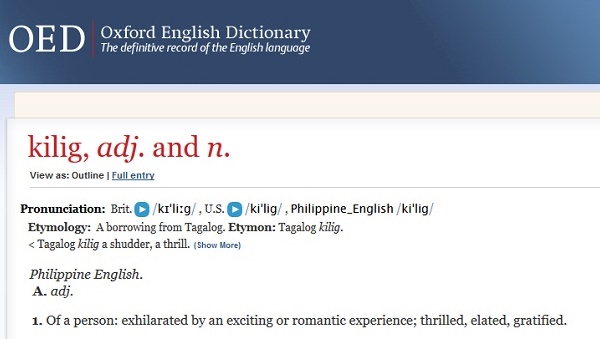‘Teleserye,’ ‘kilig’ now in Oxford Dictionary
It’s a bit of news that’s bound to make Filipinos feel kilig—that tingly feeling often brought on by waves of happy anticipation, usually romantic in nature.
The feeling, which might be difficult to translate into English, has finally been included in the Oxford English Dictionary (OED). In the March 2016 updated list of the dictionary, kilig is described as both an adjective and a noun that means a “shudder” or a “thrill.”
As an adjective, OED defines a person feeling kilig as someone “exhilarated by an exciting or romantic experience.” It could also mean “thrilled, elated or gratified.”
As a noun, kilig refers to “exhilaration or elation caused by an exciting or romantic experience.”
“A borrowing from Tagalog,” OED wrote in the etymology section of the word kilig. Among the sample phrases used by the OED are: “Kilig to the bones,” an adjective that means being utterly thrilled; “kilig factor,” an element which generates exhilaration, and “kilig moment,” a thrillingly romantic moment.
The dictionary’s web page on the word also listed several news websites as sources of phrases using the word in both news and feature stories.
Referenced articles
A lifestyle article from the Inquirer cited by the OED had the interviewee, Mikko Sumulong, saying, “When someone compliments me on something I worked on, there’s that kilig feeling that comes with me saying, ‘Thanks, I made it!’”
READ: Thread ‘n’ paper
Another referenced article was a Youngblood essay on the prom. “Everyone feels kilig as they think their friends are close to winning their date,” the writer of “Stag in the Wilderness” said.
READ: Stag in the wilderness
Then there’s the Inquirer review of the movie “Fifty Shades of Grey,” which was described as “a young adult movie, loaded with kilig moments.”
READ: ‘Fifty Shades’ and sex: Hey, I was expecting worse
‘Teleserye’
Jonathan Dent, OED senior assistant editor, said they look beyond the US and the United Kingdom to include words like ang moh, a Singapore English term for a light-skinned person, and yum cha, a Chinese meal of dim sum and tea.
The March 2016 listing also included teleserye, which refers to a television soap opera.
The June 2015 update of the OED had 40 Filipino terms as part of the dictionary’s “ongoing commitment to record words from all varieties of English, throughout the world.” It was the largest single batch of words from Philippine English, said Danica Salazar, a Filipino lexicographer based in the United Kingdom who works as consultant editor for the OED.
Over the years, several Filipino words have been added to English dictionaries.
The word “boondocks,” which refers to a rough country filled with dense brush, originated from the Tagalog word bundok, which means mountain.
Compound words
The June 2015 list had compound words and uniquely Philippine usage of English words. Included were borrowed terms from Tagalog, like halo-halo, barangay and suki, hybrid expressions like balikbayan, sari-sari store and kikay kit, and derivations like “presidentiable.”
Also included were compound words like “batchmate,” so-called blends of clipped words like “mani-pedi” or “manicure-pedicure,” initialisms like KKB or kaniya-kaniyang bayad, Filipinized translations like “go down” to mean “get off a vehicle,” conversions of nouns into adjectives, such as “high blood” to mean “angry, agitated,” as well as complete changes of word denotations, such as “gimmick” to mean a night out with friends, and “salvage,” which means “to kill” instead of “to save.”
Philippine English has long been present in the OED, with the word “abaca” included in the dictionary’s first edition in 1928. The words “Pinoy” and adobo were added in 2006. With reports from Tarra Quismundo and Inquirer Research
RELATED STORY

